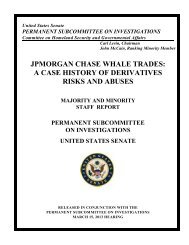JPMORGAN CHASE WHALE TRADES: A CASE HISTORY OF DERIVATIVES RISKS AND ABUSES
JPMORGAN CHASE WHALE TRADES: A CASE HISTORY OF DERIVATIVES RISKS AND ABUSES
JPMORGAN CHASE WHALE TRADES: A CASE HISTORY OF DERIVATIVES RISKS AND ABUSES
Create successful ePaper yourself
Turn your PDF publications into a flip-book with our unique Google optimized e-Paper software.
F. Analysis<br />
251<br />
The whale trades provide a striking case history of how a major bank, with 65 bank<br />
examiners on site, can keep a multi-billion-dollar derivatives portfolio off the radar screen of its<br />
regulator for years, at least until it begins to lose money. For nearly six years, JPMorgan Chase<br />
failed to disclose key information to its primary regulator about the CIO’s Synthetic Credit<br />
Portfolio, even though the bank claimed it played an important role in hedging the bank’s credit<br />
risk. The bank failed to report the existence of the portfolio to the OCC when it was created,<br />
during a 2010 examination of CIO investment portfolios, when it expanded in size by tenfold in<br />
2011, and when it produced approximately $400 million in 2011 profits. Along the way, at<br />
times, bank personnel lectured OCC examiners about being overly intrusive. The bank first<br />
reported the SCP to the OCC in January 2012, when it began breaching the bank’s VaR limit and<br />
incurring losses, but even then the bank misinformed the OCC about its significance by<br />
describing plans to reduce its size. As SCP losses mounted during the first few months of 2012,<br />
the bank failed to include information about the SCP in routine reports to the OCC. When the<br />
CIO repeatedly breached internal risk and stress limits, the bank downplayed their significance<br />
and allowed the breaches to continue. After the whale trades attracted media attention, the bank<br />
still resisted providing detailed SCP information to the OCC, disclosing the extent of the SCP<br />
losses only when it was legally compelled to disclose its financial results in an SEC filing. The<br />
OCC’s repeated requests were often ignored and not adequately enforced.<br />
The questionable bank practices that came to light when the whale trades were disclosed<br />
includes the CIO’s creation of a high risk trading portfolio using bank deposits, using valuation<br />
practices to hide losses, disregarding breaches of risk limits, manipulating risk and capital<br />
models to artificially lower the portfolio’s risk profile, and dodging OCC oversight. Because<br />
JPMorgan Chase provided such limited information about the SCP, the OCC remained in the<br />
dark about the size and risks of the portfolio for years. When losses began rolling in, it had to<br />
exercise oversight on the basis of incomplete, inaccurate, and misleading information. The<br />
bank’s practices impeded the OCC’s ability to detect and stop unsafe and unsound derivatives<br />
trading practices.<br />
At the same time, not all the fault should be laid at the foot of the bank. Over the past<br />
two years, the OCC failed to notice or investigate bank reports of CIO risk limit breaches, failed<br />
to realize when monthly CIO reports weren’t delivered, failed to insist on detailed trading data<br />
from the CIO needed for effective oversight, and failed to take firm action when the bank<br />
delayed or denied its requests for information. The OCC tolerated resistance by JPMorgan<br />
Chase to regulatory requests and failed to establish a regulatory relationship that mandated the<br />
bank’s prompt cooperation with OCC oversight efforts. The new Comptroller appears to be<br />
taking actions to correct that fundamental oversight problem. In its 2012 examinations of the<br />
CIO, for example, the OCC adopted a “clean slate” approach, requiring the bank to produce<br />
basic information about the CIO from the ground up to support all assertions about its<br />
operations. 1434<br />
The question is whether the OCC can recalibrate its regulatory relationship to<br />
achieve effective oversight, not only with JPMorgan Chase, but also other large financial<br />
institutions.<br />
1434 Subcommittee interview of Fred Crumlish, OCC (8/28/2012).



